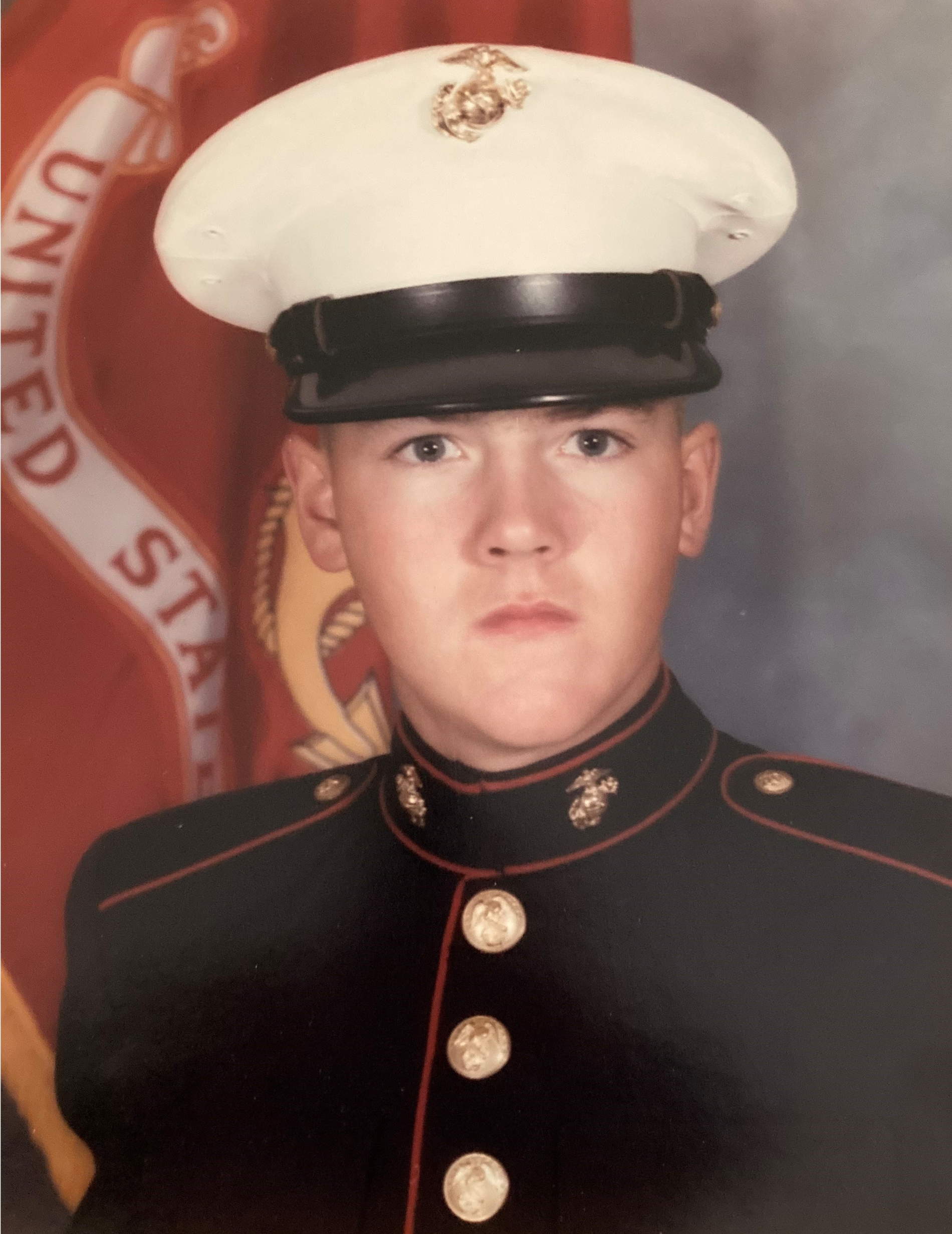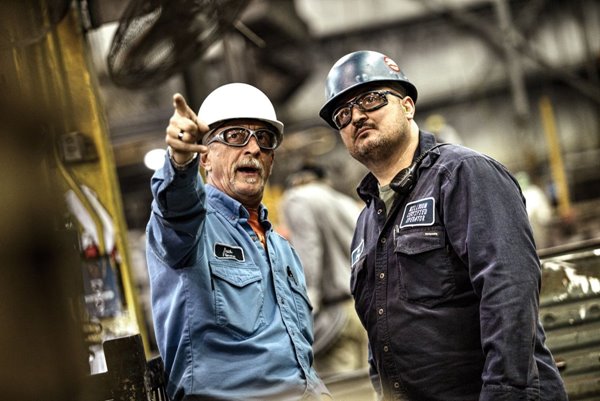From Marine Corps Radio Operator to Iron Casting Leader: Veteran’s Communication Skills Shape Waupaca Foundry
Megan Mulholland | Waupaca FoundryVeteran Spotlight: Shakout Team Leader, Kirt Bauer
Kirt Bauer’s expertise in communications, honed during his time as a Marine Corps radio operator three decades ago, continues to serve him well in his role at Waupaca Foundry. From 1987 to 1991, Bauer was with the 8th Communications Battalion based out of Camp Lejeune, responsible for ensuring secure and efficient communications in high-pressure environments. Whether carrying a radio on his back through hostile terrain or operating a mounted unit on a Humvee, his job required diligence, discipline, and quick thinking — qualities that have guided him throughout his civilian career.

 As a team leader in the shakeout department, Bauer sees a direct parallel between the communication protocols of the military and the operational “foundry secrets” at the Foundry. In a foundry manufacturing setting, "shakeout" refers to the process of removing the sand mold from the cast iron metal after it has solidified. When an iron casting is poured, it is encased in a sand mold to hold its shape during cooling. Once the part has cooled and solidified, the shakeout process begins, where the mold is broken apart and the sand is separated from the ductile iron casting. Just as encrypted military communications safeguarded crucial information from the enemy, Waupaca Foundry has its own methods of communicating and carrying out foundry processes.
As a team leader in the shakeout department, Bauer sees a direct parallel between the communication protocols of the military and the operational “foundry secrets” at the Foundry. In a foundry manufacturing setting, "shakeout" refers to the process of removing the sand mold from the cast iron metal after it has solidified. When an iron casting is poured, it is encased in a sand mold to hold its shape during cooling. Once the part has cooled and solidified, the shakeout process begins, where the mold is broken apart and the sand is separated from the ductile iron casting. Just as encrypted military communications safeguarded crucial information from the enemy, Waupaca Foundry has its own methods of communicating and carrying out foundry processes.
“We have our own way of talking about different operations, that only us guys and gals know,” Bauer explained, noting that this is key to keeping things running smoothly on the production floor.
Raised in Stephenson, Mich., Bauer enlisted in the Marines after high school in 1987 because that was “what I needed to do.” His dad was a Marine Corps veteran and Bauer wanted to make him proud and “to be part of something.” During his four years of service, his unit was highly mobile, participating in critical missions across the globe including Operation Just Cause in Panama and Desert Storm in Iraq.
Bauer’s journey at the Foundry began in 1992, when he applied through a job service, and a fellow Marine veteran who worked there helped him get his foot in the door. He worked his way up from shakeout operator to team leader, applying the same principles of integrity and dedication that he learned in the Marines. “Show up, give it your all, put your best foot forward, and take pride in what you do,” he said.
Today, Bauer’s proud daughter Annie works at the Foundry in the melt department, embodying the same values as her dad. He is also passionate about supporting fellow veterans, believing that with the right opportunities, veterans can thrive in roles that restore their sense of pride and purpose.
“Most of the time, if you give a veteran a chance, they’re going to come through for you,” Bauer said. “If you come in these doors every day and do this and are proud of yourself, it puts you back to where you were when you were in that uniform.”
When Bauer was in Iraq and Afghanistan, he appreciated the humanitarian work he and other military veterans did. “We were there to help,” he said. “And that is something I brought into life here as well. (My wife Mary and I) don’t volunteer in the community as much as we used to, but it is something we need to get back to. It is ingrained in me – to help when you can.”
"Semper fi to my Marine folk," Bauer concluded, reflecting on a career of service — both in uniform and beyond.
Waupaca Foundry is proud to employ many people who are veterans. Ten percent of our employees have served in uniform, and we thank them for their service.
#culture
#employee-spotlight
#veteran
#veterans
Kirt Bauer’s expertise in communications, honed during his time as a Marine Corps radio operator three decades ago, continues to serve him well in his role at Waupaca Foundry. From 1987 to 1991, Bauer was with the 8th Communications Battalion based out of Camp Lejeune, responsible for ensuring secure and efficient communications in high-pressure environments. Whether carrying a radio on his back through hostile terrain or operating a mounted unit on a Humvee, his job required diligence, discipline, and quick thinking — qualities that have guided him throughout his civilian career.


Waupaca Foundry's Plant 5 team leader, Kirt Bauer in his official uniform.
“We have our own way of talking about different operations, that only us guys and gals know,” Bauer explained, noting that this is key to keeping things running smoothly on the production floor.
Raised in Stephenson, Mich., Bauer enlisted in the Marines after high school in 1987 because that was “what I needed to do.” His dad was a Marine Corps veteran and Bauer wanted to make him proud and “to be part of something.” During his four years of service, his unit was highly mobile, participating in critical missions across the globe including Operation Just Cause in Panama and Desert Storm in Iraq.
Bauer’s journey at the Foundry began in 1992, when he applied through a job service, and a fellow Marine veteran who worked there helped him get his foot in the door. He worked his way up from shakeout operator to team leader, applying the same principles of integrity and dedication that he learned in the Marines. “Show up, give it your all, put your best foot forward, and take pride in what you do,” he said.
Today, Bauer’s proud daughter Annie works at the Foundry in the melt department, embodying the same values as her dad. He is also passionate about supporting fellow veterans, believing that with the right opportunities, veterans can thrive in roles that restore their sense of pride and purpose.
“Most of the time, if you give a veteran a chance, they’re going to come through for you,” Bauer said. “If you come in these doors every day and do this and are proud of yourself, it puts you back to where you were when you were in that uniform.”
When Bauer was in Iraq and Afghanistan, he appreciated the humanitarian work he and other military veterans did. “We were there to help,” he said. “And that is something I brought into life here as well. (My wife Mary and I) don’t volunteer in the community as much as we used to, but it is something we need to get back to. It is ingrained in me – to help when you can.”
"Semper fi to my Marine folk," Bauer concluded, reflecting on a career of service — both in uniform and beyond.
Waupaca Foundry is proud to employ many people who are veterans. Ten percent of our employees have served in uniform, and we thank them for their service.


We use cookies and other tracking technologies to personalize content and analyze our site traffic. More information about this is in our Privacy Policy. You can control third party cookies by adjusting your browser settings.